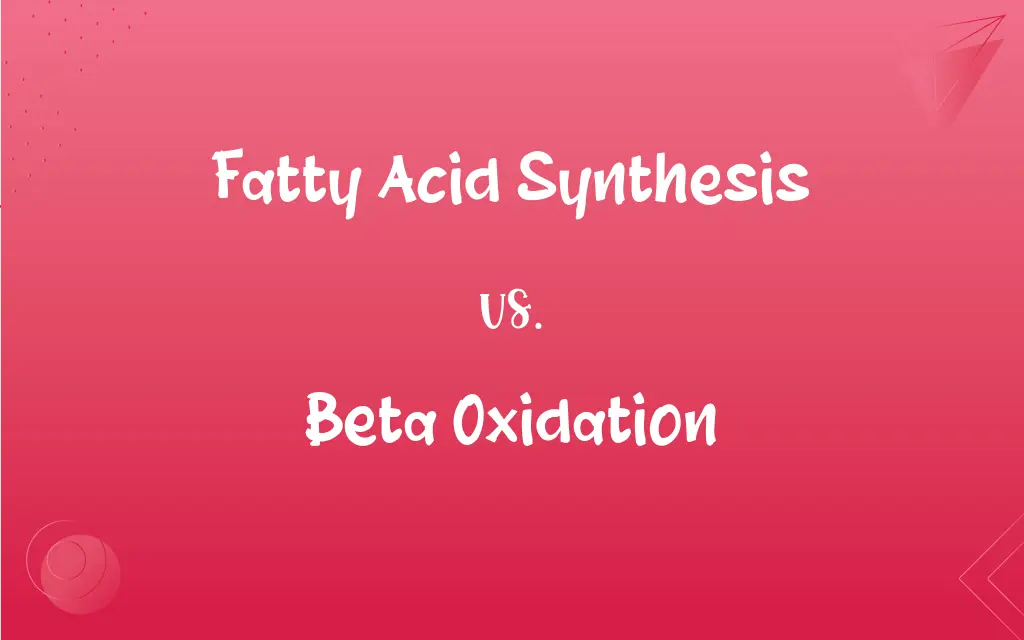Fatty Acid Synthesis vs. Beta Oxidation: What's the Difference?
Edited by Aimie Carlson || By Harlon Moss || Published on February 11, 2024
Fatty acid synthesis is the cellular process of building fatty acids, mainly in the liver and adipose tissue, while beta oxidation breaks down fatty acids for energy, primarily in mitochondria.

Key Differences
Fatty acid synthesis involves constructing fatty acids from acetyl-CoA units, occurring in the cytoplasm. Beta oxidation is the catabolic process of breaking down fatty acids into acetyl-CoA, taking place in mitochondria.
Fatty acid synthesis is an anabolic pathway, fueled by excess carbohydrates or proteins and facilitated by enzymes like acetyl-CoA carboxylase. Beta oxidation is a catabolic pathway, activated during fasting or low-carbohydrate diets, involving enzymes like acyl-CoA dehydrogenase.
Fatty acid synthesis consumes ATP and NADPH as energy sources and reduces carbon units. In contrast, beta oxidation generates ATP, NADH, and FADH2 by oxidizing fatty acids.
Fatty acid synthesis produces palmitic acid as the primary end product, which can be further elongated or desaturated. Beta oxidation sequentially cleaves two-carbon units from fatty acids, ultimately yielding acetyl-CoA.
In fatty acid synthesis, the rate-limiting step is catalyzed by acetyl-CoA carboxylase, regulated by insulin. In beta oxidation, regulation occurs at the carnitine shuttle system, influenced by the availability of fatty acids and carbohydrates.
ADVERTISEMENT
Comparison Chart
Location
Cytoplasm, mainly in liver and adipose tissue.
Mitochondria, in most tissues.
Pathway Type
Anabolic (building up).
Catabolic (breaking down).
Energy Dynamics
Consumes energy (ATP, NADPH).
Produces energy (ATP, NADH, FADH2).
Primary Enzymes
Acetyl-CoA carboxylase.
Acyl-CoA dehydrogenase.
End Products
Palmitic acid (can be further modified).
Acetyl-CoA (used in TCA cycle or ketogenesis).
ADVERTISEMENT
Fatty Acid Synthesis and Beta Oxidation Definitions
Fatty Acid Synthesis
The process is regulated by enzymes such as acetyl-CoA carboxylase.
Insulin activates acetyl-CoA carboxylase, facilitating fatty acid synthesis.
Beta Oxidation
It occurs in the mitochondria and generates ATP, NADH, and FADH2.
Beta oxidation is a key energy-producing pathway during carbohydrate restriction.
Fatty Acid Synthesis
Fatty acid synthesis results in the production of palmitic acid.
Palmitic acid, the primary product of fatty acid synthesis, can be elongated to form stearic acid.
Beta Oxidation
Beta oxidation is the process of breaking down fatty acids for energy.
During fasting, beta oxidation in the liver increases to supply energy.
Fatty Acid Synthesis
Fatty acid synthesis is the process of creating fatty acids from acetyl-CoA.
Fatty acid synthesis is upregulated in the liver when there is an excess of carbohydrates.
Beta Oxidation
Beta oxidation involves the sequential removal of two-carbon units.
Each cycle of beta oxidation shortens the fatty acid chain by two carbons.
Fatty Acid Synthesis
It is an anabolic pathway consuming ATP and NADPH.
The energy-intensive fatty acid synthesis occurs predominantly during times of caloric surplus.
Beta Oxidation
The process is initiated by enzymes like acyl-CoA dehydrogenase.
Genetic defects in acyl-CoA dehydrogenase can lead to metabolic disorders.
Fatty Acid Synthesis
Fatty acid synthesis primarily occurs in the liver and adipose tissue.
In adipose tissue, fatty acid synthesis stores excess energy as fat.
Beta Oxidation
Beta oxidation is regulated by the availability of fatty acids and carbohydrates.
High carbohydrate intake can suppress beta oxidation by inhibiting fatty acid transport into mitochondria.
Beta Oxidation
The oxidative degradation of saturated fatty acids, occurring in a repeating cycle of steps in which a two-carbon unit is removed from the molecule during each cycle.
Beta Oxidation
(biochemistry) The catabolic process by which fatty acid molecules are broken down in the cytosol in prokaryotes and in the mitochondria in eukaryotes to generate acetyl-CoA, NADH, and FADH₂.
FAQs
What role does insulin play in fatty acid synthesis?
Insulin activates key enzymes in fatty acid synthesis, like acetyl-CoA carboxylase.
Where does beta oxidation primarily occur?
Beta oxidation primarily occurs in the mitochondria of cells.
What is the primary product of fatty acid synthesis?
The primary product of fatty acid synthesis is palmitic acid.
What happens to the energy produced by beta oxidation?
Energy from beta oxidation is used for cellular activities or stored as ATP.
What triggers fatty acid synthesis?
Fatty acid synthesis is triggered by excess carbohydrates or proteins and insulin presence.
How are excess carbohydrates related to fatty acid synthesis?
Excess carbohydrates are converted to acetyl-CoA, which is then used in fatty acid synthesis.
How does beta oxidation contribute to energy production?
Beta oxidation breaks down fatty acids into acetyl-CoA, generating ATP, NADH, and FADH2.
What is the significance of acyl-CoA dehydrogenase in beta oxidation?
Acyl-CoA dehydrogenase initiates the beta oxidation process by oxidizing fatty acids.
How does fasting affect beta oxidation?
Fasting increases beta oxidation to provide energy by breaking down stored fats.
What is the end product of beta oxidation?
The end product of beta oxidation is acetyl-CoA.
What is the energy source for fatty acid synthesis?
ATP and NADPH are the energy sources for fatty acid synthesis.
How does fatty acid synthesis impact obesity?
Overactive fatty acid synthesis can contribute to obesity by storing excess calories as fat.
Can fatty acid synthesis occur in all cells?
Fatty acid synthesis primarily occurs in liver cells and adipose tissue.
Are fatty acids stored directly from fatty acid synthesis?
Yes, fatty acids synthesized are often stored as triglycerides in adipose tissue.
What influences the rate of beta oxidation?
The rate of beta oxidation is influenced by the availability of fatty acids and carbohydrate intake.
How does beta oxidation affect ketone body formation?
Beta oxidation produces acetyl-CoA, which can be used for ketone body synthesis.
Does exercise influence beta oxidation?
Yes, exercise increases the demand for energy, thus enhancing beta oxidation.
Can beta oxidation occur without oxygen?
Beta oxidation requires oxygen as it occurs in mitochondria, which rely on aerobic respiration.
What are the health implications of impaired fatty acid synthesis?
Impaired fatty acid synthesis can lead to metabolic disorders and affect energy balance.
What regulates fatty acid synthesis?
Fatty acid synthesis is regulated by enzymes and hormonal signals like insulin.
About Author
Written by
Harlon MossHarlon is a seasoned quality moderator and accomplished content writer for Difference Wiki. An alumnus of the prestigious University of California, he earned his degree in Computer Science. Leveraging his academic background, Harlon brings a meticulous and informed perspective to his work, ensuring content accuracy and excellence.
Edited by
Aimie CarlsonAimie Carlson, holding a master's degree in English literature, is a fervent English language enthusiast. She lends her writing talents to Difference Wiki, a prominent website that specializes in comparisons, offering readers insightful analyses that both captivate and inform.






































































